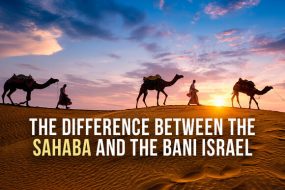
Growing up in Pakistan, the month of Sha’baan would bring in a lot of excitement and celebration. And that was because celebrating the night of the fifteenth of Sha’baan was a big thing and considered a very virtuous act, indeed. Men would gather in the masjid while the women prepared ‘Halwas’ and sweets, preparations were made for all night vigils or “Shabeenas” as they were called, buses were made available to take the men to visit the graveyards and flyers were distributed to everyone containing a long list of ‘special prayers’ so that they could stay up all night praying.
But, Alhamdulillaah, how Allaah Subhaanahu wa Ta’ala protects His Deen. When Allaah enabled me to study this beautiful religion of ours, all that changed. I realized that all those ‘special prayers’, all those night vigils, all those Halwas and all those graveyard visits were really not the way of the Prophet ![]() . In fact all that was far…far away from his Sunnah and the Sharee’ah that he brought.
. In fact all that was far…far away from his Sunnah and the Sharee’ah that he brought.
And so I thought I would bring to attention some of the misconceptions and wrong ideas attached to this month as this ignorance and innovation has become so rampant, that it has become a sort of an epidemic, not only in Pakistan but in practically every Muslim community that exists.
Misconception # 1: The night of the 15th of Sha’baan should be singled out for worship, prayer, etc.
Clarification: Our best example and role model is the Prophet (![]() ) and he never, ever singled out this night for worship or qiyaam nor did his Sahaba.
) and he never, ever singled out this night for worship or qiyaam nor did his Sahaba.
Shaykh Ibn Baaz said: “There is no saheeh hadeeth concerning the night of the fifteenth of Sha’baan. All the ahaadeeth that have been narrated concerning that are mawdoo’ (fabricated) and da’eef (weak), and have no basis. There is nothing special about this night, and no recitation of Qur’aan or prayer, whether alone or in congregation, is specified for this night. What some of the scholars have said about it being special is a weak opinion. It is not permissible to single it out for any special actions. This is the correct view. And Allah (
) is the Source of strength.” 1
Misconception # 2: There are special prayers to be offered on this night.
Clarification: The truth of the matter is that there are NO special prayers to be offered on this night specifically. And all those ‘ahaadeeth’ giving you long lists of special ‘formulas’ that are “supposed to guarantee you Allah’s forgiveness and Jannah” are all fabricated, false and innovations in our Deen. If there were such prayers, the Prophet (![]() ) would have told us about them and we would have had evidence of him and the Sahaba doing it.
) would have told us about them and we would have had evidence of him and the Sahaba doing it.
Misconception # 3: Allah (![]() ) descends to the first heavens on this night to forgive us.
) descends to the first heavens on this night to forgive us.
Clarification: Allah’s descending to the first heaven does not only happen on the night of the fifteenth of Sha’baan. Rather it happens every single night of the year.
The Prophet (
) said: “Every night when it is the last third of the night, our Lord, the Superior, the Blessed, descends to the nearest heaven and says: Is there anyone to invoke Me that I may respond to his invocation? Is there anyone to ask Me so that I may grant him his request? Is there anyone asking My forgiveness so that I may forgive him?. ” 2
Thus, when ‘Abd-Allah ibn al-Mubarak was asked about the descent of Allah (![]() ) on the night of the fifteenth of Sha’baan, he said to the one who asked him:
) on the night of the fifteenth of Sha’baan, he said to the one who asked him:
“O weak one! The night of the fifteenth?! He descends every night!”
Misconception # 4: This is the night when our fate, lifespan, and provisions are decreed.
Clarification: Some people think that the “blessed night” (laylatim-mubarakah) mentioned in Surah ad-Dukhan, 44: 3, refers to the night of 15th Sha’baan, when Allah decrees our lifespan, provisions and fate. In fact, they even pray 6 rakahs, 2 for each of these things. However, all that is fabricated and far, far away from the Sunnah. And, in reality, the “blessed night” mentioned in Surah ad-Dukhan, actually is referring to Laylatul Qadr that comes in Ramadhan. 3
Misconception # 5: One should fast on the day of the fifteenth.
Clarification: Here again, there is no saheeh reports that tell us that the Prophet (![]() ) or his Sahabah ever picked this day specifically to fast. The Sunnah of the Prophet (
) or his Sahabah ever picked this day specifically to fast. The Sunnah of the Prophet (![]() ) was to fast most of this month and not just the 15th. However, if the fifteenth of Sha’baan coincides with a Monday or Thursday, or with the three white days or if a person is generally fasting, without associating seeking extra rewards to fasting this specific day, then it is allowed. 4
) was to fast most of this month and not just the 15th. However, if the fifteenth of Sha’baan coincides with a Monday or Thursday, or with the three white days or if a person is generally fasting, without associating seeking extra rewards to fasting this specific day, then it is allowed. 4
Misconception # 6: This is the night when the souls of departed ones return to their families.
Clarification: Here again, some people misunderstand the ayat in surah al-Qadr and think that the ‘sending down of the Ruh’ as mentioned in this surah refers to the souls of dead people returning to see their families, even though it refers to Jibreel 5. And that is why we see women preparing the sweets, the Halwas and other ‘goodies’ for the souls of their loved ones.
Not only is that in itself an erroneous, deviant belief and bid’ah, but to believe that the souls of the dead can return back to the world and meet with their relatives is also totally incorrect and false. The teachings of the Qur’an and the Sunnah clearly state that the souls of the dead do not return back to the world. Besides, they don’t even eat the Halwas. It is actually you who eats it!
Misconception # 7: Visiting graveyards especially this night is something good.
Clarification: Although the Prophet (![]() ) encouraged visiting graves, he forbade singling out any day or night for any kinds of good deeds if it is not prescribed in the Sharee’ah. And he did not specifically visit the graveyard on the night of the 15th of Sha’baan. The hadeeth of Aisha that mentions that the Prophet (
) encouraged visiting graves, he forbade singling out any day or night for any kinds of good deeds if it is not prescribed in the Sharee’ah. And he did not specifically visit the graveyard on the night of the 15th of Sha’baan. The hadeeth of Aisha that mentions that the Prophet (![]() ) visited the graveyard this night is not authentic and thus does not have any proof for visiting graves specifically on this night of Sha’baan.
) visited the graveyard this night is not authentic and thus does not have any proof for visiting graves specifically on this night of Sha’baan.
Misconception # 8: Even if the ahadeeth about worship on this night are weak, one can still do it.
Clarification: The correct scholarly view is that weak ahadeeth should not be followed at all, even if they speak of righteous deeds or of targheeb and tarheeb (promises and warnings). The saheeh reports are sufficient and the Muslim has no need to follow the da’eef reports.
Shaykh Ahmad Shakir said: “There is no difference between rulings or righteous deeds; we do not take any of them from da’eef reports, rather no one has the right to use any report as evidence unless it is proven to be soundly narrated from the Messenger of Allah (
) in a saheeh or hasan hadeeth.”
Misconception # 9: Look at all those people doing it. How can they all be wrong?
Clarification: The Muslim is supposed to refer to Allah and Sunnah of His Messenger (![]() ) if there is any confusion or dispute about matters and NOT what the rest of the world is doing.
) if there is any confusion or dispute about matters and NOT what the rest of the world is doing.
“O you who believe! Obey Allah and obey the Messenger and those of you who are in authority. (And) if you differ in anything amongst yourselves, refer it to Allah and His Messenger, if you believe in Allah and in the Last Day. That is better and more suitable for final determination.” 6
Shaykh Ibn Jibreen said: “These reports (about worship and fasting an the 15th of Sha’baan) became very well known in some countries which were overwhelmed by ignorance; One should not be deceived by the large numbers of ignorant people who do these things.”
The REAL Sunnah regarding Sha’baan:
If you truly and sincerely want to please Allah (![]() ) and do deeds that will be acceptable to Him, then follow the REAL Sunnah of the Messenger (
) and do deeds that will be acceptable to Him, then follow the REAL Sunnah of the Messenger (![]() ). Here is what is proven in the authentic sunnah:
). Here is what is proven in the authentic sunnah:
1. Fast most of this month as much as you can.
Aa’ishah (
) said: “I never saw the Messenger of Allah (
) fasting for an entire month except in Ramadan, and I never saw him fast more than he did in Sha’baan.” 7
2. However, if you are weak or do not fast habitually and feel that this nafil fasting may be a hindrance to your obligatory fasting in the month of Ramadan, then the person may stop the nafil fasting in the last few days of this month. And for that person, the Prophet (![]() ) said:
) said:
“When Sha’baan is half over, do not fast.” 8
3. If you have fasts left over from last Ramadan to make up, then hurry up and do so in this month of Sha’baan before the next Ramadan comes. It is not permissible to delay missed fasts until after the following Ramadan, except in cases of necessity (such as a valid excuse that continues between the two Ramadans). Aa’ishah (![]() ) said:
) said:
‘It used to be that I had days to make up for Ramadan and I would not be able to do so except in Sha’baan.” 9
By Asma bint Shameem
Source: Alhuda Institute
If the article helped you in clearing your misconceptions about Sha’ban, let us know in the comments section below 🙂








97 replies on “Sha’baan: Misconceptions and Realities”
Assalamu alaikum,
I have a question.. first of all, I, myself am not scholar but I read the hadith about forgiveness in the 15th night of shaaban (that Allah looks at all of his creation at this night and forgives them except for the mushrik and the mushahin) that even Sh. Albani considered it to be sound and has it included in his silsila sahiha – at least this is what I read on several sites on the internet. Since I don’t know how trustworthy those sites are, I’m a bit confused now.. Is it simply a lie that is being spread to support this hadith or did the sister writing this article didn’t have this information?
I would be very grateful for clarification here, since I think this really is a heavy hadith.
By the way: it is really not my aim to cause fitna with this question and please don’t take my words to say this hadith is sahih – I have no clue, and Allah knows best – I’m just asking.
Wassalam
Brother Al Khansa you are very right – lot of these discussions are confusing and to me a waste of time,to give you an example the other day a brother was confused that if there are only 2 Eids, how come(according to him) Hadith says that Friday is Eid for believers ??
It is important to understand that,although all seasons,months,days,nights are similar but different. 4 months are honourable,Ramadhan is the best month for rewards when the reward for optional act is equal to obligatory act,Night of Qadr is better in reward than thousand months,Friday is the best day,Day of Arafa/Ashoora are blessed days. I don’t think we need to engage in futile and useless discussions- we just have to find excuse to accumulate more ‘rewards’ for our good deeds and I am sue we all are ready for Ramadhan. Wassalaam.
A/A….the same question as Your is answered on website(islamqa.com) of Sheikh Muhammed Salih Al-Munajjid….Why did we not mention the fact that Shaykh al-Albaani classed the hadeeth about the virtue of an-nusf min Sha‘baan (the middle of Sha‘baan) as saheeh?
Questioner:
When you answered the question about the soundness of the hadeeth of Abu Moosa – “Allah, may He be exalted, looks down on the night of the fifteenth of Sha‘baan and forgives all His creation except a mushrik or one who harbours hatred against the Muslims” – you gave an answer, may Allah reward you, but you did not mention the fact that this hadeeth was classed as saheeh by Shaykh al-Albaani, as I have read on some other websites. I trust you much more than I trust other websites, because of your methodology and your academic precision and honesty. But my question is: did Shaykh al-Albaani really class this hadeeth as saheeh? Because you mentioned the opinion of Shaykh al-Albaani (may Allah have mercy on him) in your fatwa, so why did you not mention it here? Is it the case that he did not say this at all, and that what is mentioned in those other websites is not correct, or what? Please note that the verdict of it being saheeh, as I have read, is to be found in Saheeh al-Jaami‘, hadeeth no. 1819.
Answer:
Praise be to Allah.
We thank you for your trust in our website, and we pray to Allah that we will live up to your expectations. We also ask Him, may He be exalted, to benefit people by means of this website and to reward with good all those who take care of it.
It is clear to everyone that we usually rely on the verdict of Shaykh al-Albaani with regard to whether a hadeeth is saheeh (sound) or da‘eef (weak). But sometimes we research a hadeeth and find a verdict by a scholar other than Shaykh al-Albaani (may Allah have mercy on him), and perhaps we may think that the vedict of the other scholars concerning a specific hadeeth to be more likely to be correct, or sometimes based on our methodology of research we that it is more appropriate not to follow the shaykh’s verdict (may Allah have mercy on him) in the case of a particular hadeeth. We may see that the view of Shaykh al-Albaani concerning a hadeeth is well known and that there are few who disagree with him, so we mention his verdict and comment on it; but sometimes we see that there are many who disagree with the verdict of Shaykh al-‘Albaani, so we decide not to mention his verdict and comment on it, and are content with what we have mentioned of the view of other scholars.
This latter scenario is what happened when we did not mention the verdict of Shaykh al-Albaani (may Allah have mercy on him) with regard to this hadeeth, and we quoted the words of Ibn Rajab al-Hanbali (may Allah have mercy on him), who said that most of the scholars classed as da‘eef the hadeeths that speak of the virtues of the middle of Sha‘baan.
However, we should point out an important matter here, which is that Shaykh al-Albaani (may Allah have mercy on him) thought that the isnaad of the hadeeth of Abu Moosa al-Ash‘ari (may Allah be pleased with him) was da‘eef! This is in harmony with what we have mentioned above about its isnaad being da‘eef, but we did not quote it from him because he – may Allah have mercy on him – thought that the hadeeth could be classed as saheeh when all its isnaads were taken into consideration.
He – may Allah have mercy on him – said:
With regard to the hadeeth of Abu Moosa, it was also narrated by Ibn Luhay‘ah from az-Zubayr ibn Sulaym from ad-Dahhaak ibn ‘Abd ar-Rahmaan from his father who said: I heard Abu Moosa (narrate) something similar from the Prophet (blessings and peace of Allah be upon him).
It was narrated by Ibn Maajah (1390) and Ibn Abi ‘Aasim al-Laalkaa’i.
I say: This is a da‘eef isnaad, because of Ibn Luhay‘ah and ‘Abd ar-Rahmaan, who is Ibn ‘Arzab and the father of ad-Dahhaak, is unknown. Ibn Maajah regarded him as weak when he narrated from Ibn Luhay‘ah.
As-Silsilah as-Saheehah (3/218)
The Shaykh (may Allah have mercy on him) mentioned the isnaads of the hadeeth and its corroborating evidence in his book as-Silsilah as-Saheehah (1144), and he concluded that the text of the hadeeth of Abu Moosa (may Allah be pleased with him) is saheeh.
But in our view, we do not think that what the shaykh (may Allah have mercy on him) said is more likely to be correct, and we do not think that those isnaads are fit to strengthen one another. At the end of our answer, we referred to the essay by Shaykh ‘Abd al-‘Azeez ibn Baaz (may Allah have mercy on him), Hukm al-Ihtifaal bi Laylat an-Nusf min Sha‘baan (Ruling on celebrating the night of the middle of Sha‘baan), in which he said:
What the majority of scholars are agreed upon is that celebrating it is an innovation, and that the hadeeths that speak of its virtues are all da‘eef, and some of them are fabricated. Among those who pointed this out is al-Haafiz Ibn Rajab in his book Lataa’if al-Ma‘aarif.
End quote.
This is what is more likely to be correct in our view. The issue of whether a hadeeth is to be classed as saheeh or da‘eef is one of the areas of ijtihaad, in which the scholar acts upon that which is more likely to be correct in his view, and in which the seeker of knowledge follows that scholarly view which is more likely to be correct in his opinion. This is not a matter in which one may denounce someone who holds a different view.
And Allah knows best.
Jazakallahu khairan
How to contact dr bilal
or his email id to contact him
Jazakillahu khairan
Jazaanaa wa iyyaakum 🙂
This has been very beneficial alhaamdulila. I was able to educate my friends and family too
JazakhaAllah khair
Jazaanaa wa iyyaakum
I have regularly seen the articles in this blog that always discouraging the all practices which Ummat Muslima is following from the time of Prophet. Why this sister is referring to ibnu baz only. Many great Muslim schollars are there in ground who contributed more than what the so called ulamas done.
What is the meaning of Weak hadit.If any person in the chain of narration committed any simple mistake in his life, Ulam-e-Hadit can consider the hadith as Dhaeef. You think that all such hadit are not spoken by Prophet (PBUH). It is more than enough for practice.
Dont make poeple confused. let them do their invocation, prayer, fasting whatever good unless it contradicts the Quran and Sunna. In this case nothing against Quran and Sunnah.
A/A…Bro. Suhail,may Allaah(swt)give us proper understanding of his religion (Al-Islaam)….”Our attitude concerning da’eef (weak) ahaadeeth which speak of good deeds”(from website=islamqa.com)…..The scholars differed concerning acting upon weak ahaadeeth which encourage righteous deeds. Some of them were of the view that it is permissible to act upon them, subject to certain conditions, and others were of the view that it is not permissible to act upon them.
Al-Haafiz ibn Hajar (may Allaah have mercy on him) summed up the conditions for it to be permissible to act upon a saheeh hadeeth, which are as follows:
1 – It should not be very weak, and one should not act upon a hadeeth which was narrated only by one of the liars or those who are accused of lying, or whose mistakes are serious.
2 – It should mention a good deed for which there is a basis in sharee’ah.
3 – When acting upon it one should not believe that the action is well-founded, rather he should do it on the basis of erring on the side of caution.
Acting upon a weak hadeeth does not mean that we believe it is mustahabb to do an act of worship simply because a da’eef hadeeth has been narrated concerning it. None of the scholars has said such a thing – as we shall see from the words of Shaykh al-Islam Ibn Taymiyah, below – rather what it means is that if it is proven that a certain act of worship is mustahabb because there is sound (saheeh) shar’i evidence – as in the case of qiyaam al-layl (supererogatory prayers at night), for example – then we find a da’eef hadeeth which speaks of the virtue of qiyaam al-layl, then there is nothing wrong with acting upon this weak hadeeth in that case. What is meant by acting upon it is narrating it in order to encourage people to do this act of worship, in the hope that the one who does it will earn the reward mentioned in the da’eef hadeeth, because acting on the weak hadeeth in this case will not lead to doing something that is forbidden in sharee’ah, such as saying that an act of worship is mustahabb that is not proven in sharee’ah. Rather, if he earns this reward all well and good, otherwise no harm is done.
Shaykh al-Islam Ibn Taymiyah (may Allaah have mercy on him) said in Majmoo’ al-Fataawa, 1/250:
It is not permissible in Islam to rely on weak ahaadeeth that are neither saheeh nor hasan, but Ahmad ibn Hanbal and other scholars regarded it is permissible to narrate reports concerning righteous deeds which are not known to be proven, so long as they are not known to be lies, on the basis that if an action is known to be prescribed in Islam from shar’i evidence, and there is a hadeeth which is not known to be a lie, it is possible that the reward referred to in that weak hadeeth may be true. None of the imams said that it is permissible to regard something as obligatory or mustahabb on the basis of a weak hadeeth; whoever says that is going against scholarly consensus. It is permissible to narrate reports that are not known to be lies in order to encourage and warn people, but only with regard to matters where it is known that Allaah has encouraged or warned against them on the basis of other evidence the status of whose narrators is not unknown. End quote.
Abu Bakr ibn al-‘Arabi said that it is not permissible to act on the basis of a weak hadeeth at all, whether with regard to virtuous deeds or otherwise… See Tadreeb al-Raawi, 1/252.
This is the view favoured by al-Albaani (may Allaah have mercy on him). See the introduction to Saheeh al-Targheeb wa’l-Tarheeb, 1/47-67.
The saheeh proven reports from the Prophet (peace and blessings of Allaah be upon him) offer us sufficient evidence that we have no need to act on the basis of weak hadeeths.
The Muslim must strive to find out which ahaadeeth are sound (saheeh) and which are weak (da’eef), and be content to act on the basis of the sound reports.
And Allaah knows best.
@ Bro.Suhail…”What should the Muslim do with regard to scholarly differences of opinion as to whether a hadeeth is sound or weak?”….
Firstly:
There is no difference among the scholars between scholarly differences of opinion as to whether a hadeeth is saheeh or da’eef, and their differences concerning matters of fiqh. That is because the classification of hadeeth as saheeh or da’eef is subject to ijtihaad and the scholars vary in their knowledge of narrators and isnaads of hadeeth. What one of them knows about the circumstances of a narrator may be unknown to others, and what another finds of corroborating reports may not be available to another. So their rulings on a particular hadeeth may differ for these reasons. Sometimes all of them found the biography of a narrator and the isnaads of a hadeeth, but they varied in the rulings as to whether it was saheeh or da’eef according to their own ijtihaad with regard to evaluating the narrator and according to their view as to whether the hadeeth is free of any problems.
Imam al-Tirmidhi said:
The imams differed in classing men (narrators) as da’eef (weak), as they differed in other aspects of knowledge.
Sunan al-Tirmidhi (5/756), Kitaab al-‘Ilal at the end of al-Sunan.
Explaining the reasons for differences of opinion among the scholars, Shaykh al-Islam Ibn Taymiyah said:
The third reason: Belief that a hadeeth is weak on the basis of ijtihaad, but others disagreed with him, regardless of other isnaads, and regardless of whether he or someone else was correct, or both of them were correct according to those who said that every mujtahid is correct. That is for several reasons, including: the one who narrated the hadeeth thought that one of them was da’eef and the other thought that he was trustworthy. Knowledge of narrators is a vast science, and the one who is correct may be the one who thought it was da’eef, because he had come across a reason to make him think so, or the other one may have been correct because he knew that this reason may not be enough to regard him as da’eef, either because that reason in and of itself is not a problem or because he had an excuse which meant that he could not be classified as da’eef.
This is a broad topic for scholars who study narrators and their circumstances, and there may be consensus and differences just as there are among other scholars in their own fields.
(Another reason is) that he did not believe that the muhaddith heard the hadeeth from the one from whom he narrated it, but someone else believed that he did hear it for reasons which imply that.
(Another reason is) that the muhaddith may have been through two phases, one when he was sound and credible and another when there was confusion about his narrations, such as he got mixed up and his books were burned or lost, so what he narrated when he was sound and credible is saheeh and what he narrated when he was confused is da’eef. So he (the scholar) may not have known which of the two scenarios applied to this hadeeth, but someone else knows that he narrated this particular hadeeth when he was sound and credible.
(Another reason is) that the muhaddith forgot that hadeeth and did not remember it afterwards, or he denied having narrated it because he thought that there was a problem which meant that he should leave this hadeeth alone, but another scholar may think that it is something that is valid and may be quoted as evidence. This issue is well known … and there are other reasons too.
Majmoo’ al-Fataawa (20/240-242).
Secondly:
With regard to the Muslim’s attitude towards these differences which occur among scholars with regard to whether a hadeeth is saheeh of da’eef, it is the same attitude as that towards their differences of opinion in fiqh. If he is qualified to distinguish between their opinions, he may decide which of the two rulings concerning one hadeeth he thinks is correct; if he is not qualified to do so, then he should follow the opinion of a scholar (taqleed) and he should accept the verdict of the one who he thinks is more religiously committed and has greater knowledge concerning this matter. He should not be deceived by the fact that he is a faqeeh or scholar of usool or mufassir, rather the one whose verdict of saheeh or da’eef is followed should be prominent in the science of hadeeth, and there is no sin on him if he follows a prominent scholar. If the hadeeth is saheeh according to that scholar and he follows him in that, and it contains a fiqhi ruling, then he must act upon it, but there is no sin on him for not acting upon it if the hadeeth is da’eef.
Shaykh Ibn ‘Uthaymeen (may Allaah have mercy on him) said:
If the scholars differed concerning it in their fatwas or what is heard in their exhortations and advice, for example, then he should follow the one who he thinks is closer to the truth in his knowledge and religious commitment.
Liqa’ al-Baab il-Maftooh (no. 46, question no. 1136)
And Allaah knows best.
Excellent article which must reach every Muslim household. Many misconceptions removed. Jazakallah khair
You can do your part by sharing in sha Allah 🙂 Jazaanaa wa iyyaakum
Jazakallah.
However, regarding misconception #3 – Allah descends from the 3rd part of the night,, however on this night, Allah descends from the time of maghrib on this night only. Not just the last 3rd of the night.
Brother i searched for the ahadees abt 15th sha’aban once i found it in Taramidhi n in it’s explanation it is mentioned that this hadees is weak as the writer mentioned above …
Search by yourself the ahadees n then check the link or authentication of it….
Even if this wasn’t sunnah, it’s wrong to call it bidah. By calling something that is inherently good bidah you might be keeping someone from doing extra ibadah that they might not otherwise do during this month. If a person truly believes that Allah swt is going to forgive their sins on that night and that causes them to put an extra effort into prayer, the night will bring them closer to Allah swt and elevate their iman. Allah knows best.
Masha ALLAH doctor. .thnx for guiding us..
You are welcome 🙂
Jazaakallaahu khairan. This an eye opener. May Allaah SWT guide us all
Ameen
I really appreciate the explanation. May Allah continue to bless us. Masalam
Ameen
[…] I Just had to share this as there are many many innovations regarding such stuff. Make sure you read it and share it http://blog.islamiconlineuniversity.com/shabaan-misconceptions-and-realities […]
Jazakillah khairan….Alhumdulillah. .was struggling to get the perfect answer…n Alhumdulillah ★ Allah ne aasan kardiya…
Jazaanaa wa iyyaakum 🙂 We are glad we were able to help!
What is sad really is the fact,all those refuting the article have probably little knowledge of islam.
They mostly do,what they have seen their families do over the years.
Its sorrowful that people want the best of teachers and want to go to the best of institutes,whenever it comes to some worldly exam(they’ll go to the best tutors to learn english but they’ll never bother to learn the quranic Arabic.Never!).While on the other hand,they want to learn(or mostly not learn but definitely want to comment on islam without any knowledge!) on their own.And when you ask them have they read and pondered over the Quran they’ll say we can do it on our own(which by the way never happens!)or they’ll tell you we did read the translation;its lamenting to know how this glorious book is understood by few.
veri nice
Zajakallahu khyeer…
If all ahdees r fake and fabricated which r followed since 1400 years ago by all muslims and specially fiqah e hanfia (which is collected by 40 specialist islamic schllors).fiqah e hanfiah is a great and right fiqah according to holy quran, hadees and islsmic histoty…all news ways of islam adopting against fiqah e hanfia f wrong and fitna in muslim ummah…all muslims shoul be carefull and takd decision according to fjqah e hanfia.GOD help us and secure to us from new fitnaas like alhuda fitna, jemat e islami fitna, shia fitna and vahabi fitna, , deobendi fitna
….
Salaam Dr, Bilal. I have many families and relatives who still have a strong thing for shabe e barath. Please clarify it world wide. People in Bangladesh believe everyone in the West are modernized and this want to forget this holiday.
I agree with most of brief given Dr Bilal.One has to follow Sunnah & not depend on conjecture or innovations in Islam saying no harm in praying extra. If this is accepted then one could say better pray 4 Raka’a Fard in Fajar to gain more rewards. Surely this is completely disobeying Allah(swt) & His Prophet( sslalahwsallam).So let us follow Allah(swt)&His Prophet(may Allah be pleased with him).
Jazaakillaah khairan sister. .
Al hamdulillah:)
Shukran. it has helped me a lot. And I will procede to read “Striving for ease”. Jazakallahu Kheir.
Assalamu alaikum
Dr. I need more explanation about this ” if ahadeeth is weak should not be followed even if they speak of righteous deeds. I’m confused Dr.
JazakAllah for the enlightenment. A few sisters brought up the topic today and were debating on it.I shall pass on this word to them Inshallah.
Jazakallahukhairan
Jazakallahukhairan
Masha Allah beautiful article Jazak Allah khair
Al Hum Dulliah, The information and reality of Sha’aban helps to understand the reality of the night, and it clears all misconception about it. Jazak Allahu Khayran ( TEAM) 🙂
May Allah Bless us and Guide us to straight path.
Jazak Allah Khayr very informative
Jazakallaho khairan for sharing such an important piece of information.
Assalamualaikum. I read the full article and I want to translate the article to Bengali and Publish to My website http://islamicsolutions.net to reach more Muslim People who know Bengali well, If you give permission to me.Assalamualaikum.
Mashaa’Allah very nice.. Jazak’Allahu Khair
Thank you for clearing the misconception. May Allah bless you.
May the Almighty ALLAH swt reward you and all the people behind this blog for spreading and educating ALL of us in the true path of the Deen, in the Right perspective….Aameen
There are too many innovations in the religion. Thank you for clarification..
Alhamdulillah this helped alot…JazakALLAH
Very enriching indeed. .jazakAllah I will also to add that im reading a book by Dr Bilal Philips. .Tawheed. .its v interesting and am learning a lot subhan Allah
aalhamdulillah!!! I benefited alot from this great Islamic articles. In facts it figures out the misconception about the month of Sha’abaan.
JazakAllah khair for clarification
The article is too good. Jazak Allah khair.
Jazakallah Khair for sharing this very very important article,we see most of Muslim brothers and sisters preparing for this Night and Making Extra Ibadah..May Allah Subhanahu wa Taala Guide them and us as well..Ameen
JazakAllah for the clarification.
Sometimes people combine religion with culture
And that creates the confusion.
Jazzakallahu khair. May Allah reward you abundantly. . .
Assalam o alaikum. Jazakallah khairan for sharing this beautiful and useful information with us it really helped me
JezakumuAllah kheiren jemia for the reminder and good effort to make a clear informetion. BarekeAllah fikum. N Dr. Bilal
Jazaakallah khairan sister this thought i also have been wondering your words were so simple could understand very well may Allah bless u and ur family i have shared ur post in Facebook i have changed ur first introduction paragraph
so my family memebers could under stand a little bit more thank you for sharing such a knowledge
Subhan Allah. This has been very Ibeneficial for me. All my life I was taught the wrong way.
Very enriching indeed. .jazakAllah
Jazakallah Khair.. This article showering light on those still believe the special relevance on 15th of Shaaban. In our village also so many muslim people still taking fasting on this day and offering special prayer at graveyard to our beloved who buried there.
Still we are trying to correct them but they are blaming us to make da’eef all related hadeeth to this special day.!!!
Jazak Allah khairan for sharing
Mashallah very nice article. It clarified my concepts.
Alhamdulillah, Jazzakummullahu khairan
MashaAllah a beautiful article. Just i am a bit confused about fasting in the last half of shabaan. Is the ruling that we may fast if we can or we should not fast at all in the last 15 days of shabaan. Plz clarify. Jazakallah khair
Salam dear brothers and sisters..
Since childhood i have always celebrated 15th of shabaan.. as i followed my mother… i use to live in dubai.. surprisingly nooo arabs celebrated like us.. then it happenend one day i spoke to one of my friends whose an arab.. i asked her dont they celebrate.. she said shes never heard of this day before ever.. and thats when alarms started ringing.. but i still celebrated and hesitated the same time.. later on when i cane to UK slowly slowly i got to learn islam more in depth and realised there is no hadith or ayah from quran to back this celebration up.. its a pure innovation created by asians.. my advice pls dont celebrate this specific day.. if you wanna do ibadah do all the nights why singling out one night?? May Allah guide us all and forgive our sins as we all are sinners..Ameen!!
Jazakallah
All Hamdulillah it is need an very resourceful article, step by step clarification. Jazakallahu Khair for the article .
Al Hamdulillah it is need an very resourceful article, step by step clarification. Jazakallahu Khair for the article .
Al Hamdulillah it is in deed an very resourceful article, step by step clarification. Jazakallahu Khair for the article .
*** Short 3mins Clip***
The 15th Sha’ban, ibn Taymiya and Weak Hadith
https://youtu.be/QdPdm_L_i0w
Couple of things he did not mention in the vide were that the scholars kept the weak hadith in the separate book, so other scholars can study the chain and rule on other hadith. These weak hadith were not to be followed. Imam Ahmad, Tirmidhi, Bukhari all did that. Also, setting up reward and belief using only the weak hadith has never been accepted. A statement has to be proven to be from the Prophet to tell us that there is a reward in an act, which we can not logical figure out.
JazakAllahkhairan, this is surely an eye opener. Sharing this information with my family and friends in-sha Allah.
This is such a wonderful article. May Allah guides us all
Thank you, JAK helped me understand.
Can anyone plz clearfy this “blessed night” mentioned in Surah ad-Dukhan, actually is referring to Laylatul Qadr that comes in Ramadhan.
JazakAllah Khairan!
JazakAllah Khairan
Assalamo alaikum
Why not all scholars give the correct path..Every one has his own views. Mufti Taqi usmani of Pakistan told 15 is blessed night..you are telling different…and second question why muslim scholars united against attack on palestine. .why arab countries supporting isreal by using his products …like in drink pepsi and coke are common…
JAZAKALLAH Khairan…..for sharing such a important info….this articls sort out many confusions….ALLAH accept from you….ameen…
Jazak’Allah khairan. Thanks so much. This has really cleared alot of misconceptions. May Allah make us better Muslims everyday and may He ease our affairs. Ameen 🙂
Jazakallah Khairan Sister…..
this is the best article I have read so far as to clear huge misunderstandings about this night. surely Allah SWT protects his deen in the best way. May Allah bless you with the best reward aameen.
jazakAllah khair!!
Jazaanaa wa iyyaakum 🙂 We are glad it helped you!
Alhamdulillah. Shukran for the enlightenment.
BarkaAllah feek
MashaAllah, informative May Allah Almighty bless you a lot insha Allah
Very good and authentic article
Jazakillahu khairan.
May Allah reward you for this information. I always encourage sisters and brothers to visit this site for knowledge.
Assalamu alaikum. I would like to ask if it’s allowed to fast on the days of the white nights of Sha’aban , that being the intention and the person hoping to continue fasting on these days in the other months too after Ramadan by Allah’s will. That being asked, pls i need clarification on the days of the white nights, are they the 14th, 15th and 16th or the 15th, 16th and 17th being that night comes before day. Jazakum Allah khairan.
JazakAllahu khairan for the clarification, It is true that majority of us Muslims associate certain acts of worship with the month of Shaaban, As mentioned in the article neither of these Ibadas exist in Islam nor the prophet of Sahabas did during their lifetime. Therefore i call upon everyone of us to spread the message because understandably there may be some communities practicing them up to now.
Alhamdulillah. Excellent article. Have shared as much as I can..
Great article…. Excellent clarification. May Allah bless you with wealth of emaan.
Alhamdulilah..
really helpful
Jazaakallah
Keep on doing noble work like this
May Allah grants ur guidance
Imam Ahmed Hanbal used weak hadith’s in his madhab rather than akal. I find it very ironic that we should complety disregard weak hadith’s. What if the weak hadith is true. You basically prevented others from doing a sunnah. There are also correct opinions according to some scholars that your book of deeds go up in shaban, but we don’t know what day.
After reading this article one question that pops us in my mind is; I have seen people around me celebrating shab-e-bar’at since childhood and my parents have seen this since their childhood, so how come that they have been doing wrong deeds for last 3/4 of the century and one fine morning a person comes up and says all those deeds you are doing are not right and I shall tell you the correct teachings of Islam. I have heard a hadith, subject matter of which is; this ummah will not gather on anything wrong. If i go by this hadith then whatever being said regarding this night is not false.